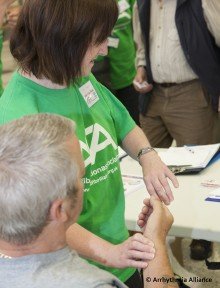Your pulse is important as it signals the regular pumping of blood around your body which carries oxygen and nutrients. If it is irregular it could mean you are affected by Atrial Fibrillation (AF) a fairly common heart rhythm disturbance which is associated with causing a stroke.
Whilst being more common in people aged over 75, AF can affect adults of any age and affects about 1.5% of the population.
Everyone is different but if you have an irregular pulse or a persistent heart rate above 120 bpm or below 40 bpm you should seek advice.
There are many reasons why your pulse may be slow or fast which include medications, caffeine, your level of fitness or existing conditions or illnesses including heart conditions, stress and anxiety.
Local GP Dr Adam Fraser “We are asking people to check their pulse this week as Atrial Fibrillation can affect adults who may otherwise not be aware that they could be at risk of stroke.
One of the easiest places to feel your pulse is on your wrist, just below your thumb – but if you are having problems ask your doctor or other health professional next time you have an appointment.
If you do check your pulse and have concerns don’t panic as there are a number of things that affect your heart rate and rhythm. Make an appointment to see your GP or practice nurse who can offer you further advice on what you can do to reduce your risk such as exercising regularly, giving up smoking or ensuring you eat a healthy balanced diet”.
It is normal for your pulse rate to change during the day depending on what you are doing so it is a good idea to try taking your pulse at various points throughout the day both before and after a range of activities. To get your baseline pulse and normal rhythm, try taking your resting pulse when you wake in the morning and before going to bed.
More information on Atrial Fibrillation along with a guide on how to monitor your own pulse is available via the NHS Dorset CCG website www.dorsetccg.nhs.uk or www.atrialfibrillation.org.uk.







